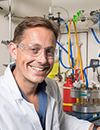| Conferences > Innovations in Microfluidics & 3D-Printing Europe 2024 > Keynote Speakers |
| Register | Login |
Mandy EschProject Leader, National Institute of Standards and Technology (NIST) Mandy B. Esch is a project leader in the Microsystems and Nanotechnology Division of the National Institute of Standards and Technology. She received a Diploma (equivalent to the American M.S. degree) in Biology and a Dr. rer. nat. (equivalent to the American Ph.D. degree) in Biotechnology from the Julius Maximilians University in Würzburg, Germany. During her PhD research she developed paper-based microfluidics and microfluidic biosensors for the detection of pathogens. In 2001, Dr. Esch joined the Cornell Nanoscale Science and Technology Facility as life sciences liaison. In 2007, she joined the Department of Biomedical Engineering at Cornell University as a Postdoctoral Research Associate. While there, she developed patents for cell culture on a porous 3D surface and for a multi-organ microphysiological system (MPS). She was part of the team that in 2015 received the Lush Science Prize for designing multi-organ fluidic cell culture systems. From 2015 to 2016 Dr. Esch spent a year as Assistant Professor at Syracuse University (Department of Biomedical and Chemical Engineering), where she taught nanobiotechnology. In August 2016 Dr. Esch moved to NIST, where she is focusing on integrating sensors with tissues-on-chips and multi-organ microphysiological systems. |
Burcu GumuscuAssistant Professor Biosensors and Devices Lab, Eindhoven University of Technology Dr. Burcu Gumuscu-Sefunc is an assistant professor at the Biomedical Engineering department in Eindhoven University of Technology, where she leads Biosensors and Devices group. She is a pioneer of hydrogel micropatterned surfaces via capillary pinning and protein-barcoded hydrogel microparticles for single cell analysis. More recently she focuses on developing digital microfluidic platforms to study cell-biomaterial interactions for long-term experiments. Gumuscu-Sefunc received prestigious Royal Dutch Academy of Science (KHMW) Pieter Langerhuizen grant in 2019, Irene Curie fellowship grant in 2020, NWO Gravitation grant in 2022. She is an editorial board member at Micromachines, Frontiers in Digital Health and Frontiers in Lab on a Chip Technologies Journals. |
Stephen HiltonAssociate Professor, University College London School of Pharmacy Dr Stephen Hilton is an Associate Professor at UCL School of Pharmacy. Dr Hilton's diverse research interests range from medicinal chemistry, scale-up synthesis and new technology with an emphasis on the applications of 3D printing and Virtual Reality in Synthetic Chemistry and Pharmaceutical applications. Dr Stephen Hilton is the Inventor of the IKA FLOW - continuous flow reactor, which is partnered and sold by IKA. The IKA FLOW features unique 3D printed reactors at its core that were developed in the Hilton group and the group’s current focus is on the application of 3D printing towards new continuous flow technology, catalysis, methodology and linking of the technology to Virtual Reality. |
Simon KuhnAssociate Professor, Katholieke Universiteit Leuven Dr Kuhn received his Diploma from TU Munich in 2004, and his PhD from ETH Zurich in 2008. From 2008-2010, he worked as Scientist at the Paul Scherrer Institute (PSI), Switzerland, and from 2010-2012 as post-doctoral Fellow at the Massachusetts Institute of Technology (MIT), USA. Dr Kuhn joined the Department of Chemical Engineering at UCL as Lecturer in 2012, and in July 2014 he was appointed associate professor at KU Leuven. His research interests lie in the characterization of transport processes in complex flows using experiments and modeling, scaling-up microchemical systems, and design of advanced flow reactors for process intensification. |




